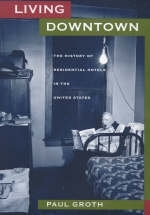
Living Downtown
The History of Residential Hotels in the United States
Seiten
1999
|
New edition
University of California Press (Verlag)
978-0-520-21954-0 (ISBN)
University of California Press (Verlag)
978-0-520-21954-0 (ISBN)
- Titel ist leider vergriffen;
keine Neuauflage - Artikel merken
Residential hotels have been an element of American urban life for nearly 200 years. This text examines their social and cultural history, demonstrating that these hotels have played a valuable socio-economic role as homes to both long-term residents and temporary labourers.
From the palace hotels of the elite to cheap lodging houses, residential hotels have been an element of American urban life for nearly two hundred years. Since 1870, however, they have been the target of an official war led by people whose concept of home does not include the hotel. Do these residences constitute an essential housing resource, or are they, as charged, a public nuisance??;p"Living Downtown", a social and cultural history of life in American residential hotels, adds a historical perspective to this ongoing debate. Combining evidence from biographies, buildings and urban neighbourhoods, workplace records, and housing policies, Paul Groth provides an analysis of life in four price-differentiated types of downtown residence. He demonstrates that these hotels have played a valuable socio-economic role as home to both long-term residents and temporary labourers. Also, the convenience of hotels has made them the residence of choice for a surprising number of Americans, from hobo author Boxcar Bertha to Calvin Coolidge.
Groth examines the social and cultural objections to hotel households and the increasing efforts to eliminate them, which have led to the seemingly irrational
From the palace hotels of the elite to cheap lodging houses, residential hotels have been an element of American urban life for nearly two hundred years. Since 1870, however, they have been the target of an official war led by people whose concept of home does not include the hotel. Do these residences constitute an essential housing resource, or are they, as charged, a public nuisance??;p"Living Downtown", a social and cultural history of life in American residential hotels, adds a historical perspective to this ongoing debate. Combining evidence from biographies, buildings and urban neighbourhoods, workplace records, and housing policies, Paul Groth provides an analysis of life in four price-differentiated types of downtown residence. He demonstrates that these hotels have played a valuable socio-economic role as home to both long-term residents and temporary labourers. Also, the convenience of hotels has made them the residence of choice for a surprising number of Americans, from hobo author Boxcar Bertha to Calvin Coolidge.
Groth examines the social and cultural objections to hotel households and the increasing efforts to eliminate them, which have led to the seemingly irrational
Paul Groth is Associate Professor of Architecture History at the University of California, Berkeley.
| Erscheint lt. Verlag | 29.6.1999 |
|---|---|
| Zusatzinfo | 120 b/w photographs, 44 figures, 4 tables |
| Verlagsort | Berkerley |
| Sprache | englisch |
| Maße | 178 x 248 mm |
| Gewicht | 508 g |
| Themenwelt | Reisen ► Hotel- / Restaurantführer ► Nord- / Mittelamerika |
| Geschichte ► Teilgebiete der Geschichte ► Kulturgeschichte | |
| Sozialwissenschaften ► Pädagogik ► Sozialpädagogik | |
| Sozialwissenschaften ► Soziologie | |
| ISBN-10 | 0-520-21954-6 / 0520219546 |
| ISBN-13 | 978-0-520-21954-0 / 9780520219540 |
| Zustand | Neuware |
| Haben Sie eine Frage zum Produkt? |
Mehr entdecken
aus dem Bereich
aus dem Bereich
der stille Abschied vom bäuerlichen Leben in Deutschland
Buch | Hardcover (2023)
C.H.Beck (Verlag)
23,00 €
vom Mittelalter bis zur Gegenwart
Buch | Softcover (2024)
C.H.Beck (Verlag)
12,00 €


